Karen:
Do Actions Speak Louder Than Words?
When Heide listed as one of her favorite scenes Sarah going to the
Arsenal match with Paul, she also said "It's obvious to me that he doesn't
really want her there." I agree. He doesn't want her there. First, when
Sarah admits to Jo that she is going to the match, she says: "thought I
should." Not, Paul asked me, Paul wanted me to go or even Paul's been trying
to get me to go for ages and I couldn't think up any more excuses (shades
of the Netherfield Ball!). Then, when they arrive at the game, she lags
behind and, after she catches up, says "You said you'd look after me."
He replies: "You said you didn't need looking after." So, Paul had to be
talked into it.
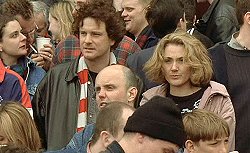 So
here's where the problems lie: Paul's always throwing her lack of understanding
of who he is in her face. After Hillsborough, she says: "I don't get you."
Paul replies: "No, no, you don't. It's not just me you don't get, it's
any of us." Yet, here she is, wanting to better understand what his life
is all about, and he does nothing positive. I don't know about you, ladies,
but if a guy were taking me to a football match and wanted me to understand,
appreciate or enjoy what was taking place, he would have bought seats!
Like his dad did. No, Paul shells out a mere £5 for her to stand
on lump of concrete, where you can't see and where you're not even safe.
How can anyone learn to love a game if they are part of a rowdy mob? So
here's where the problems lie: Paul's always throwing her lack of understanding
of who he is in her face. After Hillsborough, she says: "I don't get you."
Paul replies: "No, no, you don't. It's not just me you don't get, it's
any of us." Yet, here she is, wanting to better understand what his life
is all about, and he does nothing positive. I don't know about you, ladies,
but if a guy were taking me to a football match and wanted me to understand,
appreciate or enjoy what was taking place, he would have bought seats!
Like his dad did. No, Paul shells out a mere £5 for her to stand
on lump of concrete, where you can't see and where you're not even safe.
How can anyone learn to love a game if they are part of a rowdy mob?
Shouldn't true "colon-ization" involve a pilgrimage to the holiest of
all shrines, the stadium? Why does Paul virtually ensure that she's going
to hate it? What's his problem?
Bethan:
He probably doesn't really want Sarah to share his obsession. He sees
it as a male-bonding sort of thing. If Sarah really did become an Arsenal
fanatic, he'd probably resent it.
Marcia:
The point is well taken that, when the female joins the male in eager
fandom and ceases to be the beer-getter and snack-fixer, she is usually
not as welcome. She would be wise to play it a little stupid and let his
ego have an airing when he tells her for the fortieth time the fine details
of rugby, football, cricket, or quoits.
Heide:
(Karen) Why does Paul virtually ensure that she's going to hate
it [Arsenal match]?
Actually, Paul may not even realize how awful an outsider might find
the whole thing. The lump of concrete is where he wants to be. He's surrounded
by his people, in the thick of them where emotions are running highest.
He may think this is the best way in the world to watch a match and not
have any perception at all how someone else would view it. Interesting
how it is Steve who gets Sarah (and Paul) something warm to drink. To Paul's
credit, he does see Sarah is in distress and puts his arm around her as
she clings to him to stay on her feet. But the look on his face is "Oh,
bollocks, why'd she have to come?"
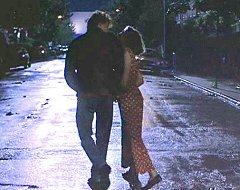 (Bethan)
I like the way they walk together at the end, slightly apart and then holding
hands, and, yes, I do think that the relationship will last. (Bethan)
I like the way they walk together at the end, slightly apart and then holding
hands, and, yes, I do think that the relationship will last.
Good scene and a point in their favor. They've been apart for awhile
but instead of rushing off to bed immediately, they take a long walk and
have a cozy chat. Sarah is flirting quite openly with him in this scene
and he's certainly enjoying it.
What have film critics said about it? I gather that the movie has been
generally well received with some reviewers not able to give it a full
endorsement but Colin's performance has been praised. Can anyone
share some reviews they may have saved? Very curious.
Question: after Hillsborough, did Britain outlaw standing room at the
ends of the field? I seem to remember that but may be getting it confused
with general admissions at rock concerts which was outlawed in the US.
Ann:
(Renate) his book is about football obsession and not about love.
(Karen) from UK Empire (April 1997): "The film...tells how one man's
obsession with a football team obstructs the path of true love..."
The movie is not about football, I give you that, but it is about "football
obsession." Nothing in the US compares to the level of fanaticism of some
British football fans—not Hoosier basketball fans or Green Bay cheeseheads.
Without some understanding of the levels football obsession can reach,
or an understanding of the whole culture surrounding football fans in Britain,
an American audience would have a very difficult time understanding FP.
I've watched enough shows like Cracker and enough stories about run-amok
British fans to have a fairly good understanding of it, but the general
American audience would be mostly lost.
Renate:
(Renate) his book is about football obsession and not about love.
He extremely understated the 'falling-in-love routine,' to avoid the cliché.
Since my line above is quoted several times here I feel I have to explain.
I mentioned FP the book to emphasize where Nick Hornby comes from,
what his original intention on the subject must have been. Even if he wrote
a love story into FP the film, it surely was not his home turf,
forgive me the mix of metaphors. Moreover, as a male, his idea of a romantic
love story must be different from that of, let's say, Jane Austen lovers.
;-). Though I understand and share the disappointment that we don't get
more romance, I cannot follow the criticism about the low-keyness of the
love story expressed here in the discussion. One cannot expect that a film
based on a book about a love affair with a football team turns out to be
a chick-flick. Despite some shortcomings in the romantic department, it
is for me a feel-good movie.
(Ann) Nothing in the US compares to the level of fanaticism of some
British football fans
You have a very good point here. Not only is the fanaticism level different,
it seems that sports have another meaning in the US than in Europe. In
the US, sports enthusiasm (not fanaticism) seems to be quite common, widely
spread and, most important, well accepted. (Please correct me if I am wrong.
I don't claim to be an expert in things US/Europe culture gap.) In Germany
f.e. sports enthusiasm is more looked upon as something for people with
a low intelligence level who cannot be bothered with reading or thinking
(a POV represented perfectly by Sarah). An enthusiastic love for sports
usually is looked upon as a kind of character deficiency, such as vanity
perhaps, or pride :-) Sports fanaticism is a weakness, indeed :-). Particularly
football is a low-class pleasure. If you are a sports fanatic and want
to be taken seriously intellectually, you have to show something to balance
it. The whole thing seems to be a bit schizophrenic, since sports are very
important, considering the amount of time spent for sports on TV and the
amount of newspaper space. It was a very interesting phenomenon to see,
when the World Championship took place it the US, `Fußball', as we
call it in Germany, underwent a kind of image lift. Apparently it somehow
profited from the different attitude the Americans have toward sports,
whatever that may be.
Arami:
(Heide) after Hillsborough, did Britain outlaw standing room at
the ends of the field?
Yes. It's seats only now. But the main reason for the disaster was
a high chain-link fence preventing the crowd from invading the pitch. As
the crowd kept pouring into the compound, those near the fence had nowhere
to escape.
Renate:
BTW there was a similar tragedy in Belgium, in the Heisel stadium.
A lot of people died. I couldn't help but cry when I watched those pictures
on TV, though I never had any sympathy for football fanatics. That memory
comes back every time I watch that scene in FP, when Paul is crying.
Adds a lot to the impact of the film.
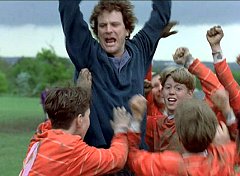 Heide: Heide:
I was able to access some reviews of Fever Pitch. Colin comes
off very well in all I've read, which brings me to a point. The character
Paul could have been very unlikeable. He could easily have come across
as petulant, selfish, moronic, pessimistic. Instead Colin seemed to jump
into this character with such an infectious enthusiasm that we're all carried
along. He's able to show Paul's charming, witty, attractive, boyish, almost
innocent side making the audience root for this guy even if we're peeved
with him sometimes. And doesn't it seem as if our dear boy really was enjoying
himself? What a pleasure it is to watch this film.
Janine:
Favorite Outfit: That would have to be the blue jeans
and the black T-shirt Paul's wearing in the kitchen argument. Runners up
are the gray v-neck sweater for the table football scene, the light T-shirt
with faded denim overshirt in the classroom and the charcoal pullover he's
wearing while waiting for Sarah on the park bench.
Favorite Stubble: There are several good stubble scenes
as well, but my favorite is where Paul is on the telephone with his mom.
Favorite Line: I think we all have a lot of these. And
they change daily. At the moment, my favorite is "Will you please, please,
please, please. ****ing **** off. You have arrived at the worst 60 seconds
of my life." Also, "mortgage, wife, kid...cool!" If that isn't a child
speaking, I don't know what is.
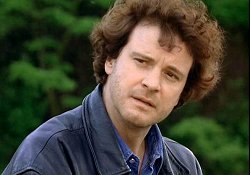 Favorite
Scene: The restaurant scene, followed closely by the parking lot
scene. I just decided that I love this one because it's so sweet. She's
making a big deal of the big game and he's playing down its importance
(it's just a stupid game) I think each to reach out a little to the other.
A runner up is Paul and Steve watching the big game, and Paul constantly
threatening to leave. These two have a great chemistry as friends. I wonder
how long they supposedly have known each other because Steve seems like
the only person who knows how to deal with him when he behaves like a petulant
child. There is also a link here to a couple more of my favorite lines.
Paul asks Steve if he is on "Cloud Cuckooland" and says welcome to the
real world. And Steve says "In the real world it's nil-nil at half time."
I also love when he looks at Paul and says "Do you know where I'm coming
from?" Favorite
Scene: The restaurant scene, followed closely by the parking lot
scene. I just decided that I love this one because it's so sweet. She's
making a big deal of the big game and he's playing down its importance
(it's just a stupid game) I think each to reach out a little to the other.
A runner up is Paul and Steve watching the big game, and Paul constantly
threatening to leave. These two have a great chemistry as friends. I wonder
how long they supposedly have known each other because Steve seems like
the only person who knows how to deal with him when he behaves like a petulant
child. There is also a link here to a couple more of my favorite lines.
Paul asks Steve if he is on "Cloud Cuckooland" and says welcome to the
real world. And Steve says "In the real world it's nil-nil at half time."
I also love when he looks at Paul and says "Do you know where I'm coming
from?"
Saddest Scene: Where he's talking to his mom on the phone,
she asks about Sarah, and he lies. That just broke my heart. Runner up
is after Hillsborough, when Sarah assumes he won't be going back to any
more matches and he says he will. The moment when she takes a long look
at him and says "I just don't get you" and he takes an equally long look
at her and says "No, I know you don't." I think it's a moment of revelation
for both of them. He's realizing that she has no clue as to what makes
him tick. It's like in this moment they both see that there's no hope for
them as a couple at all.
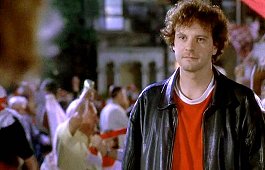 Favorite
Kissing Scene: At the celebration. I love that whole scene—how
they spot each other and come toward each other. I slo-mo'd this kiss,
and it was so lovely—Paul with his eyes closed, making the approach. He
looked so beautiful, and when he finally kisses her it's like "ah...home" Favorite
Kissing Scene: At the celebration. I love that whole scene—how
they spot each other and come toward each other. I slo-mo'd this kiss,
and it was so lovely—Paul with his eyes closed, making the approach. He
looked so beautiful, and when he finally kisses her it's like "ah...home"
At this point I have a couple of questions:
(1) At Parents Night, why does the guy who sits with Paul after Robert
Parker's mother say "I suppose you're feeling pretty pleased with life
at the moment." What does he mean? Is he talking about Arsenal, is he being
sarcastic, is it because he has the longest line of people waiting to see
him? Any thoughts?
(2) At the restaurant, Paul suggests a name for the baby, the same
name as a famous footballer. But I couldn't make out what he said. Does
anyone know.
(3) What are the words to the song Paul starts singing in the car after
house hunting?
And Heide, you were spot on about the kid having the Colin/Darcy walk
down pat. It was identical. He did a great job studying.
Sylvia:
(Janine) And Steve says "In the real world it's nil-nil at half
time!"
That's one of my favorite lines too. Steve has some of the best lines.
His comments during the decisive last match (when Paul doesn't know if
he wants to stay or leave) and the billiard game (when Paul tells him what
a good feeling he has this season) make me think that he lives more in
reality than Paul.
A question to those who read the book FP: do you think that it
would have been possible to turn the book into a film without major changes
because it covers a long period of time and deals with an introspective
subject. Bringing Sarah to the story provides a bridge between Paul and
the audience, but it is difficult to do both aspects (the football story
and the love story) credit. Paul has a problem to balance the two and so
has the movie.
Arami:
Janine's Questions:
At Parents Night: Paul must be well known among fathers as a footie
fan/Arsenal supporter. I guess the remark is about Arsenal
Name for the baby: Liam
What are the words to the song Paul starts singing? "There's only one
Martin Hayes"
Karen:
(Bethan) I like the way they walk together at the end, slightly
apart and then holding hands
Oh, how I wish you could airbrush out the credits at the end of the
film. Toward the end of their walk down the street, it looked like they
were slow dancing. The final shot looks like he has twirled her back. Does
it look like that to anyone else?
(Bethan) He probably doesn't really want Sarah to share his obsession.
He sees it as a male-bonding sort of thing. If Sarah really did become
an Arsenal fanatic, he'd probably resent it.
It is a bonding sort of thing, but not exclusive to males. His mother
and his sister are part of his world. I had been trying to avoid discussing
the obsession/fan thing, but I guess it's not possible.
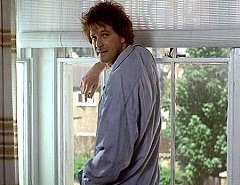 I
view his obsession with Arsenal as a means to an end, which is why I don't
think the sports aspect to the story is critical. Obsession can be about
anything. Paul talks about what's important about Arsenal several times.
One is in the voiceover about becoming part of a family and the other is
when they are looking at the house next to the stadium. He says he is "rootless";
he lacks an identity. Paul derives his identity from the crowd. He shares
a history with the crowd. He is on a first name basis with people standing
on the North Bank and that started out early on. Remember the scene when
his ticket was for the wrong end. He answers many questions Sarah poses
to him as "we." He says things like "She's one of the those women who don't
understand us." But the one that got me was when she said he couldn't go
back after Hillsborough. He answered: "Of course, we will." I
view his obsession with Arsenal as a means to an end, which is why I don't
think the sports aspect to the story is critical. Obsession can be about
anything. Paul talks about what's important about Arsenal several times.
One is in the voiceover about becoming part of a family and the other is
when they are looking at the house next to the stadium. He says he is "rootless";
he lacks an identity. Paul derives his identity from the crowd. He shares
a history with the crowd. He is on a first name basis with people standing
on the North Bank and that started out early on. Remember the scene when
his ticket was for the wrong end. He answers many questions Sarah poses
to him as "we." He says things like "She's one of the those women who don't
understand us." But the one that got me was when she said he couldn't go
back after Hillsborough. He answered: "Of course, we will."
Given my take on him, he would want to share his interest with Sarah.
(This brings back old memories of being dragged on a fishing trip, being
cold, uncomfortable and bored out of my mind!)
(Heide) Actually, Paul may not even realize how awful an outsider
might find the whole thing.
I think he has a good idea of it because he evidently tried to dissuade
her from coming.
(Heide) The lump of concrete is where he wants to be.
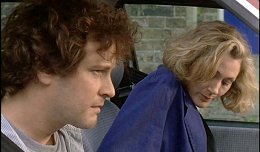 Absolutely.
This is where he wants to be. On one hand, I still think he should have
responded more positively to her effort by bringing her along slowly. On
the other hand, the rowdy mob in the stands is him and yes this is where
she would see it to understand it. I'm quite torn with what he should have
done. I don't think it's a simple thing. Absolutely.
This is where he wants to be. On one hand, I still think he should have
responded more positively to her effort by bringing her along slowly. On
the other hand, the rowdy mob in the stands is him and yes this is where
she would see it to understand it. I'm quite torn with what he should have
done. I don't think it's a simple thing.
(Heide) To Paul's credit, he does see Sarah is in distress and puts
his arm around her as she clings to him to stay on her feet. But the look
on his face is "Oh, bollocks, why'd she have to come?"
I did give Paul credit for caring for her when the crowd is really
surging, but I didn't read the expression on his face that way. What I
saw was regret that he subjected her to this; she had become too important
to him to be mauled like that. Maybe he should have sprung for seats.
(Heide) The character Paul could have been very unlikeable. He could
easily have come across as petulant, selfish, moronic, pessimistic.
No, I think we like him despite his petulance, selfishness, moronic
behavior and pessimism, which is—I agree—quite a feat for our Colin. He
made a character like that, a lout, a yob, an uncouth hooligan not only
likable, but lovable not only in our eyes but, more importantly in Sarah's
eyes because if he didn't, we wouldn't believe that she fell in love with
him. (Paul and Steve work so well together because Paul is the pessimist
and Steve is the optimist.)
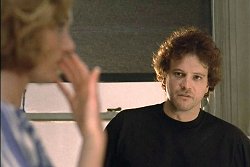 (Heide)
He's able to show Paul's charming, witty, attractive, boyish, almost innocent
side making the audience root for this guy even if we're peeved with him
sometimes. (Heide)
He's able to show Paul's charming, witty, attractive, boyish, almost innocent
side making the audience root for this guy even if we're peeved with him
sometimes.
Absolutely, and I think "peeved" is rather generous. When he threw
in "loss of child" to the pregnant Sarah during the "you haven't wanted
anything for 18 years speech," I wanted to kick him! His psyche may have
been hurting from the loss of the game, but that was the meanest thing
he ever said.
(Janine) the parking lot scene...She's making a big deal of the big
game and he's playing it's importance down (it's just a stupid game)
He can't possibly mean it. Just look at him watching the game.
Arami:
(Karen) a lout, a yob, an uncouth hooligan
Well, I do not see him quite that way. Real British louts, yobs and
hooligans are much, much worse. He is laddish (high-spirited rogue), not
loutish (crude, ill-mannered).
Nan:
(Marcia) when the female joins the male in eager fandom, and ceases
to be the beer-getter and snack-fixer, she is usually not as welcome.
In my experience, many men prefer to share their sports obsessions
with other men. That's not to say that all men are this way, but I've come
across more of the first kind—who not only discourage and belittle my interest
in hockey, but actually become irritated by it. I can't tell you how many
times I've had men ask me, in the most condescending of tones, "So, if
you're such a big hockey fan, what's a plus/minus rating? What's icing?
What's offside?" They get most annoyed when I answer correctly and heaven
forbid I should leave anything out! I think it is the general perception
that women just watch sports to look at the men. BTW, I don't deny doing
that too ;-p
(Karen) ["it's just a game"] He can't possibly mean it. Just look
at him watching the game.
Common sports fanatic affliction. If things are going well, you're
praying to God and swearing to be good if He'll only let your team win.
If things are not going well, you start to downplay the importance of it
in your mind so you won't be devastated when they lose. I think he blew
up when she said it because, to him, she's an outsider who can't possibly
understand his torment. It's similar to talking about one's mother. You
can say whatever you want ('cause it's your mother, after all), but no
one else is allowed to say it. ;-)
Heide:
(Janine) Favorite Scene: The restaurant scene, followed closely
by the parking lot scene.
This is fast becoming one of my favorites too. She is letting him know
she still cares. And, like Nan, I think he's downplaying the importance
of this game to him. If it's too important, he'll jinx them. I also think
this is one of the sadder scenes in the film.
(Karen) But the one that got me was when she said he couldn't go
back after Hillsborough. He answered: "Of course, we will."
And "we" doesn't mean Sarah.
(Heide) Actually, Paul may not even realize how awful an outsider
might find the whole thing.
(Karen) I think he has a good idea of it because he evidently tried
to dissuade her from coming.
I don't see it that way. I agree that the hooliganism was quite well
known except to the fanatic. It's either "that's not me and my people"
or "the press blows everything out of proportion." I think Sarah may have
made him see that it was all pretty awful standing, not seeing anything
which increases his anger at her.
Karen:
(Nan) the flowers that the Arsenal players carry on the field
(Arami) Wasn't it some kind of a tribute to the Hillsborough tragedy?
Arami was quite right; the flowers were a tribute. The Arsenal players
took their bouquets and handed them to the fans who stood in the Kop, the
equivalent of the North Bank but at Liverpool's Anfield stadium.
Allison:
I have been wanting to comment seriously for a little while now but
kept finding my thoughts too serious and undrooly. It was not the success
that I think Nick Hornby hoped for and I think it interesting to understand
why. I think it also would explain why it was not shown in the US.
I think the actors were all extremely good. My Arsenal-supporting teenage
son advised me to see it. "Colin Firth is a really good actor." I hope
CF's ears were burning. Having seen it in the cinema, I agree with those
critics (most of them) who found it too televisual (is that a word?). Channel
4 "sludge'ovision, one critic, called it. Also, and I think most importantly,
Hornby shouldn't have been allowed to write the film play (also not an
original comment). I found the film funny. I laughed out loud, which I
rarely do. I just think he does not handle the romantic part of comedy
well. For me the most convincing dialogue is between Paul and Steve. I
think Hornby is most at ease in a man's world and it shows. It is interesting
that he has not been asked to write the screenplays for his other books.
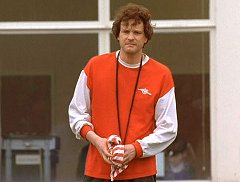 Karen: Karen:
(Allison) It was not the success that I think Nick Hornby hoped
for...I think it also would explain why it was not shown in the US.
I think soccer is the reason it was not shown in the U.S. It's really
hard for me to come up with other movies that have featured soccer. I recall
a Stallone movie that took place during WWII that featured prisoners playing
a big soccer match (I think). The name escapes me.
Would I have seen this movie had it not been for CF? I don't know. But
if it had been promoted as a romantic comedy, involving a sports addict
and his straight-laced love interest? Absolutely. I still maintain that
knowledge of soccer is not required—useful, but not required.
(Allison) Hornby shouldn't have been allowed to write the film play
I think he did a "brilliant" job. I'm about 80% through with the nonfiction
book and amazed at how he took portions of his own character and turned
it into little things that Paul did that if you didn't read the book you
wouldn't know it had special meaning. I thought the dialogue was good.
(Allison) For me the most convincing dialogue is between Paul and
Steve.
I liked Jo too. Her lines and their delivery were great. After the
breakup, she asks Sarah about the football results. Jo comments about Liverpool,
admitting that she's heard of them and that they're good. At the end, she
says something like "but do we really care?"
Heide:
I have decided to take Paul at his word—when he tells us his relationship
with Arsenal changed that night and that his failures and successes don't
depend on the team anymore. If he can say that 8 or 9 years later, then
I suppose it can be true and there's no reason to think he can't be a happy
family man now. My ever-Pollyanna outlook wins out in the end. Fade out
as they walk off into the sunset (or the stadium lights, whichever the
case may be).
Beth:
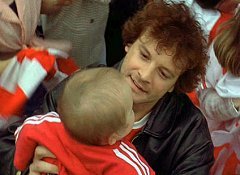 Drooling
aside, I can honestly understand Sarah's love for Paul. Why? I married
a guy a lot like him. He wasn't a sports fanatic but he was a 36-year-old
child in many ways. I don't know what it was about him really, except for
maybe the unruly dark curly hair, big dark eyes and dimples. Well, I know
there has been a lot of speculation about their relationship lasting. I
married the guy and it's been 11 years now. My husband has grown up a lot
and is very devoted to his family. He still talks a lot of nonsense sometimes
but I've learned to laugh more and not get annoyed as much. Their relationship
is very believable to me. Most people wanted to strangle him at times but
he is well-liked and endearing. I loved Colin in this part and was totally
charmed by the experience that was so close to my own. Drooling
aside, I can honestly understand Sarah's love for Paul. Why? I married
a guy a lot like him. He wasn't a sports fanatic but he was a 36-year-old
child in many ways. I don't know what it was about him really, except for
maybe the unruly dark curly hair, big dark eyes and dimples. Well, I know
there has been a lot of speculation about their relationship lasting. I
married the guy and it's been 11 years now. My husband has grown up a lot
and is very devoted to his family. He still talks a lot of nonsense sometimes
but I've learned to laugh more and not get annoyed as much. Their relationship
is very believable to me. Most people wanted to strangle him at times but
he is well-liked and endearing. I loved Colin in this part and was totally
charmed by the experience that was so close to my own.
Arami:
Thanks for that, Beth. I just knew it was very believable all the time.
I'm so glad to see your evidence.
Beth:
I'm glad I've given some of you hope for Paul and Sarah's future, although
it will take a great deal of patience on her part for sure. I loved the
scene in the restaurant. Oh could I relate to her look when she was observing
the father of her unborn set the napkin on fire. Been there (similar circumstances).
The house hunting, job interview—GREAT! He really wanted to grow up but
was following her lead. Their relationship was physical for the most part.
It's not deep but it's real. I also liked the fact that Sarah was compared
to the Arsenal manager by someone other than Paul which really helped her
recognize that though he was naive he could be very insightful. I think
it gave her a little hope that maybe he was right after all and that they
would make a good team. She did need a little lightening up and he needed
a bit more balance and structure.
I also believed his changed relationship with Arsenal. After waiting
18 years for the victory, he knew the intensity of that experience could
never be repeated. As for his ability to change and become responsible,
he quit smoking. Anyone who has smoked knows how hard that is.
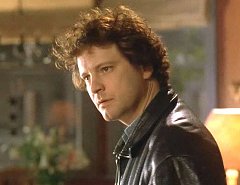 Favorite
scene: "F..... It." And then gives her a ride home. Neither one of them
wants the baggage of the other but the attraction is too tempting. "Can
I smoke?" "No, but you can stay the night" What a rollercoaster of emotions
for him in those couple of minutes. And I was so glad that she finally
got laid. She looked so happy jogging in the next scene. Favorite
scene: "F..... It." And then gives her a ride home. Neither one of them
wants the baggage of the other but the attraction is too tempting. "Can
I smoke?" "No, but you can stay the night" What a rollercoaster of emotions
for him in those couple of minutes. And I was so glad that she finally
got laid. She looked so happy jogging in the next scene.
Bethan:
(Beth) I loved Colin in this part and was totally charmed by the
experience that was so close to my own.
Lovely to read this, Beth. I think you've just provided proof that
Paul and Sarah will have a happy and lasting relationship!
Karen:
Have now finished the nonfiction book and High Fidelity and
am drooling over all the pictures in the screenplay. Both books need to
be read to understand first the Paul character and then the relationship.
A fun and quick read. In fact both books can be read in less than a week
(especially if you skip over the nonessential description of football games
;-0).
Winter:
I've seen it twice now, and I think I'm going to love it each time
I see it. I mean, I was really entertained by the story, not just Colin.
the absolute best scene was at the last minute of the match, (done in slo-mo)
when Colin's bounding up the stairs as Mark Strong yells "Paaauuuullll!!!"
the look on their faces as the goal is made is priceless! |
 So
here's where the problems lie: Paul's always throwing her lack of understanding
of who he is in her face. After Hillsborough, she says: "I don't get you."
Paul replies: "No, no, you don't. It's not just me you don't get, it's
any of us." Yet, here she is, wanting to better understand what his life
is all about, and he does nothing positive. I don't know about you, ladies,
but if a guy were taking me to a football match and wanted me to understand,
appreciate or enjoy what was taking place, he would have bought seats!
Like his dad did. No, Paul shells out a mere £5 for her to stand
on lump of concrete, where you can't see and where you're not even safe.
How can anyone learn to love a game if they are part of a rowdy mob?
So
here's where the problems lie: Paul's always throwing her lack of understanding
of who he is in her face. After Hillsborough, she says: "I don't get you."
Paul replies: "No, no, you don't. It's not just me you don't get, it's
any of us." Yet, here she is, wanting to better understand what his life
is all about, and he does nothing positive. I don't know about you, ladies,
but if a guy were taking me to a football match and wanted me to understand,
appreciate or enjoy what was taking place, he would have bought seats!
Like his dad did. No, Paul shells out a mere £5 for her to stand
on lump of concrete, where you can't see and where you're not even safe.
How can anyone learn to love a game if they are part of a rowdy mob?
 (Bethan)
I like the way they walk together at the end, slightly apart and then holding
hands, and, yes, I do think that the relationship will last.
(Bethan)
I like the way they walk together at the end, slightly apart and then holding
hands, and, yes, I do think that the relationship will last.
 Heide:
Heide:
 Favorite
Scene: The restaurant scene, followed closely by the parking lot
scene. I just decided that I love this one because it's so sweet. She's
making a big deal of the big game and he's playing down its importance
(it's just a stupid game) I think each to reach out a little to the other.
A runner up is Paul and Steve watching the big game, and Paul constantly
threatening to leave. These two have a great chemistry as friends. I wonder
how long they supposedly have known each other because Steve seems like
the only person who knows how to deal with him when he behaves like a petulant
child. There is also a link here to a couple more of my favorite lines.
Paul asks Steve if he is on "Cloud Cuckooland" and says welcome to the
real world. And Steve says "In the real world it's nil-nil at half time."
I also love when he looks at Paul and says "Do you know where I'm coming
from?"
Favorite
Scene: The restaurant scene, followed closely by the parking lot
scene. I just decided that I love this one because it's so sweet. She's
making a big deal of the big game and he's playing down its importance
(it's just a stupid game) I think each to reach out a little to the other.
A runner up is Paul and Steve watching the big game, and Paul constantly
threatening to leave. These two have a great chemistry as friends. I wonder
how long they supposedly have known each other because Steve seems like
the only person who knows how to deal with him when he behaves like a petulant
child. There is also a link here to a couple more of my favorite lines.
Paul asks Steve if he is on "Cloud Cuckooland" and says welcome to the
real world. And Steve says "In the real world it's nil-nil at half time."
I also love when he looks at Paul and says "Do you know where I'm coming
from?"
 Favorite
Kissing Scene: At the celebration. I love that whole scene—how
they spot each other and come toward each other. I slo-mo'd this kiss,
and it was so lovely—Paul with his eyes closed, making the approach. He
looked so beautiful, and when he finally kisses her it's like "ah...home"
Favorite
Kissing Scene: At the celebration. I love that whole scene—how
they spot each other and come toward each other. I slo-mo'd this kiss,
and it was so lovely—Paul with his eyes closed, making the approach. He
looked so beautiful, and when he finally kisses her it's like "ah...home"
 I
view his obsession with Arsenal as a means to an end, which is why I don't
think the sports aspect to the story is critical. Obsession can be about
anything. Paul talks about what's important about Arsenal several times.
One is in the voiceover about becoming part of a family and the other is
when they are looking at the house next to the stadium. He says he is "rootless";
he lacks an identity. Paul derives his identity from the crowd. He shares
a history with the crowd. He is on a first name basis with people standing
on the North Bank and that started out early on. Remember the scene when
his ticket was for the wrong end. He answers many questions Sarah poses
to him as "we." He says things like "She's one of the those women who don't
understand us." But the one that got me was when she said he couldn't go
back after Hillsborough. He answered: "Of course, we will."
I
view his obsession with Arsenal as a means to an end, which is why I don't
think the sports aspect to the story is critical. Obsession can be about
anything. Paul talks about what's important about Arsenal several times.
One is in the voiceover about becoming part of a family and the other is
when they are looking at the house next to the stadium. He says he is "rootless";
he lacks an identity. Paul derives his identity from the crowd. He shares
a history with the crowd. He is on a first name basis with people standing
on the North Bank and that started out early on. Remember the scene when
his ticket was for the wrong end. He answers many questions Sarah poses
to him as "we." He says things like "She's one of the those women who don't
understand us." But the one that got me was when she said he couldn't go
back after Hillsborough. He answered: "Of course, we will."
 Absolutely.
This is where he wants to be. On one hand, I still think he should have
responded more positively to her effort by bringing her along slowly. On
the other hand, the rowdy mob in the stands is him and yes this is where
she would see it to understand it. I'm quite torn with what he should have
done. I don't think it's a simple thing.
Absolutely.
This is where he wants to be. On one hand, I still think he should have
responded more positively to her effort by bringing her along slowly. On
the other hand, the rowdy mob in the stands is him and yes this is where
she would see it to understand it. I'm quite torn with what he should have
done. I don't think it's a simple thing.
 (Heide)
He's able to show Paul's charming, witty, attractive, boyish, almost innocent
side making the audience root for this guy even if we're peeved with him
sometimes.
(Heide)
He's able to show Paul's charming, witty, attractive, boyish, almost innocent
side making the audience root for this guy even if we're peeved with him
sometimes.
 Karen:
Karen:
 Drooling
aside, I can honestly understand Sarah's love for Paul. Why? I married
a guy a lot like him. He wasn't a sports fanatic but he was a 36-year-old
child in many ways. I don't know what it was about him really, except for
maybe the unruly dark curly hair, big dark eyes and dimples. Well, I know
there has been a lot of speculation about their relationship lasting. I
married the guy and it's been 11 years now. My husband has grown up a lot
and is very devoted to his family. He still talks a lot of nonsense sometimes
but I've learned to laugh more and not get annoyed as much. Their relationship
is very believable to me. Most people wanted to strangle him at times but
he is well-liked and endearing. I loved Colin in this part and was totally
charmed by the experience that was so close to my own.
Drooling
aside, I can honestly understand Sarah's love for Paul. Why? I married
a guy a lot like him. He wasn't a sports fanatic but he was a 36-year-old
child in many ways. I don't know what it was about him really, except for
maybe the unruly dark curly hair, big dark eyes and dimples. Well, I know
there has been a lot of speculation about their relationship lasting. I
married the guy and it's been 11 years now. My husband has grown up a lot
and is very devoted to his family. He still talks a lot of nonsense sometimes
but I've learned to laugh more and not get annoyed as much. Their relationship
is very believable to me. Most people wanted to strangle him at times but
he is well-liked and endearing. I loved Colin in this part and was totally
charmed by the experience that was so close to my own.
 Favorite
scene: "F..... It." And then gives her a ride home. Neither one of them
wants the baggage of the other but the attraction is too tempting. "Can
I smoke?" "No, but you can stay the night" What a rollercoaster of emotions
for him in those couple of minutes. And I was so glad that she finally
got laid. She looked so happy jogging in the next scene.
Favorite
scene: "F..... It." And then gives her a ride home. Neither one of them
wants the baggage of the other but the attraction is too tempting. "Can
I smoke?" "No, but you can stay the night" What a rollercoaster of emotions
for him in those couple of minutes. And I was so glad that she finally
got laid. She looked so happy jogging in the next scene.